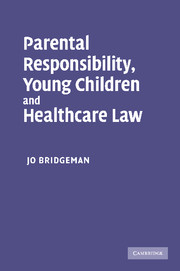Book contents
- Frontmatter
- Contents
- Acknowledgements
- Table of cases
- Table of legislation and international instruments
- 1 Parents, young children and healthcare law
- 2 Child-centred healthcare services for children
- 3 Child health and parental obligations
- 4 In the best interests of the child?
- 5 The quality of life of severely disabled children
- 6 Obligations and caring responsibilities
- 7 Relational responsibilities
- Bibliography
- Index
5 - The quality of life of severely disabled children
Published online by Cambridge University Press: 17 July 2009
- Frontmatter
- Contents
- Acknowledgements
- Table of cases
- Table of legislation and international instruments
- 1 Parents, young children and healthcare law
- 2 Child-centred healthcare services for children
- 3 Child health and parental obligations
- 4 In the best interests of the child?
- 5 The quality of life of severely disabled children
- 6 Obligations and caring responsibilities
- 7 Relational responsibilities
- Bibliography
- Index
Summary
Introduction
Some parents of children with severe disabilities are confronted with the question whether it would be in their child's best interests for life-prolonging treatment to be withheld or withdrawn with the intention of ending their child's pain and suffering and ensuring a peaceful death. This chapter undertakes a full analysis of the law governing these difficult decisions which are, primarily, reached through agreement between parents and professionals. Two children feature very prominently in this chapter. Throughout, there is analysis of the role of the law in decisions about the future care of Charlotte Wyatt repeatedly referred, by her parents and the doctors taking care of her, to the High Court for determination, with occasional reference to the Court of Appeal. There is also specific consideration of the care of one child: David Glass, born with mental and physical disabilities, was twelve at the time of the hospital care which was the subject of legal proceedings and eighteen by the time the European Court of Human Rights (ECtHR) gave judgment. Central to all of the cases considered is the question of the quality of life of the child and whether it is morally correct for one person to form a judgment about another's quality of life. The litigation which has brought the predicament of these children and their parents into the public realm demonstrates the need to examine the responsibilities of parents and professionals for the care of children with severe disabilities within the wider context of attitudes to the disabled and the limits of medical science, technology and knowledge.
- Type
- Chapter
- Information
- Parental Responsibility, Young Children and Healthcare Law , pp. 158 - 195Publisher: Cambridge University PressPrint publication year: 2007



